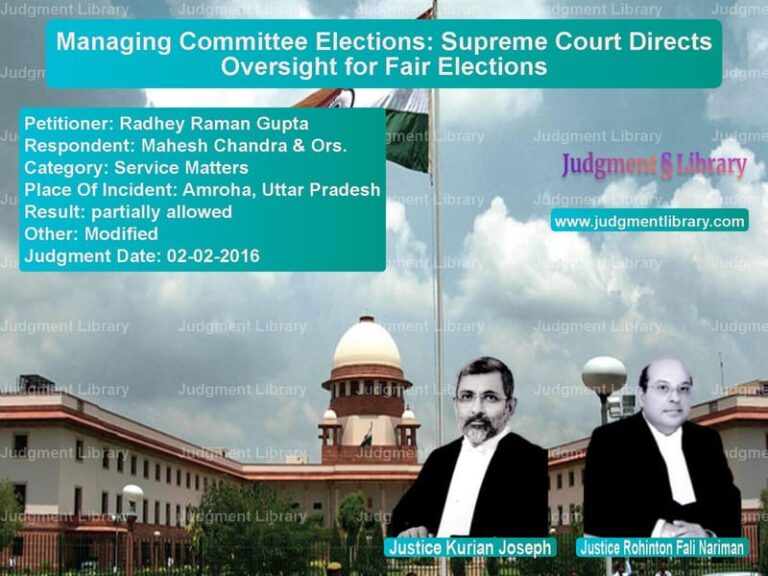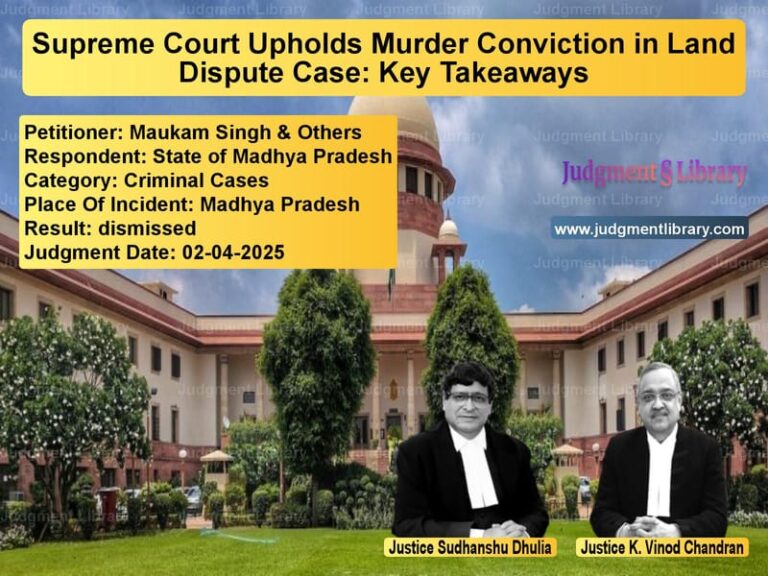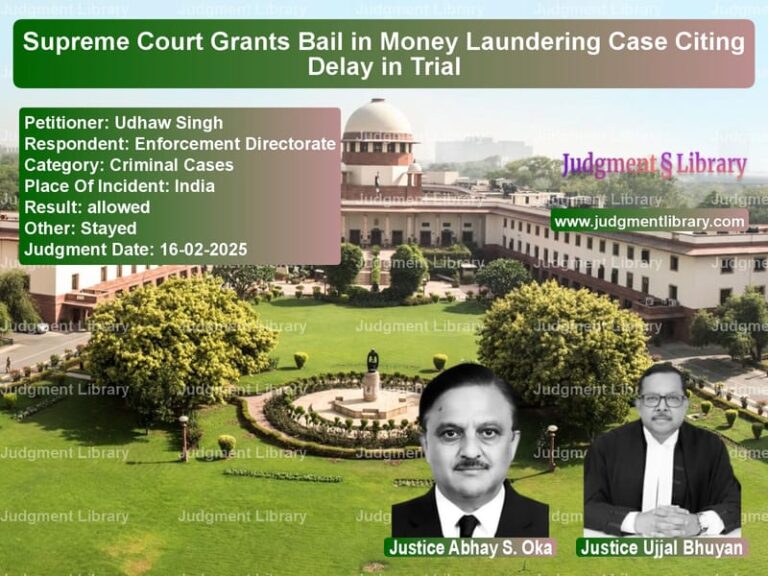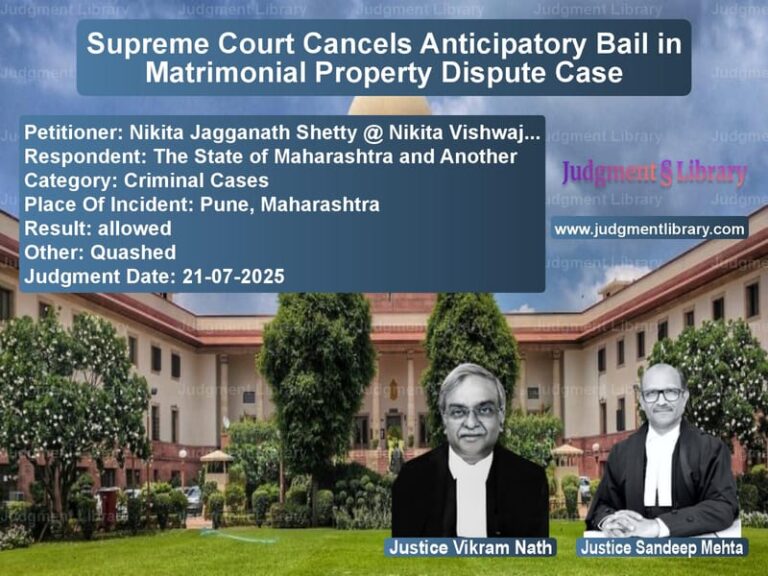Supreme Court Quashes Criminal Case Over Job Scam Allegations: Examining Misuse of Legal System
The case of Deepak Kumar Shrivas & Anr. v. State of Chhattisgarh & Ors. presented an important legal question regarding the misuse of criminal prosecution for private disputes. The Supreme Court quashed the criminal proceedings, emphasizing that the case was not about punishing a crime but rather a coercive attempt to recover money through legal pressure. The judgment serves as a cautionary precedent for law enforcement to avoid becoming entangled in matters that are better suited for civil resolution.
Background of the Case
The dispute arose from allegations of financial fraud between the parties, where both sides accused each other of taking money to secure a government job. The appellants initially filed a complaint in April 2021 against Respondent No.6, Rajkumari Maravi, claiming she promised to secure a job for the appellant’s brother in exchange for money. When the job did not materialize, the appellants sought a refund, which led to threats and avoidance by the respondent.
The case took a complicated turn when, after an official inquiry, the respondent herself accused the appellants of fraud. In July 2022, more than a year later, an FIR was registered against the appellants, alleging they had taken ₹4 lakh to secure a job for the respondent’s daughter. The matter reached the Chhattisgarh High Court, where the appellants sought to quash the FIR, arguing that the case was frivolous and initiated with malicious intent.
Petitioners’ Arguments
The appellants, represented by their counsel, raised the following key arguments:
- The FIR was a retaliatory counterblast filed to avoid repaying the money.
- An official inquiry had already been conducted, and both parties had accused each other of fraud.
- The respondent did not file any complaint for more than three years, making the allegations suspicious.
- The dispute was purely financial and did not warrant criminal prosecution.
Respondents’ Arguments
The State of Chhattisgarh and Respondent No.6 countered the petitioners’ claims, arguing that:
- A cognizable offense was made out in the FIR, justifying an investigation.
- The appellant had allegedly defrauded the respondent by taking ₹4 lakh for a government job and failing to deliver.
- The delay in filing the FIR should not be a ground to quash the criminal proceedings.
- The case should proceed so that the truth could emerge through an investigation.
Supreme Court’s Observations
The Supreme Court, led by Justices Vikram Nath and Satish Chandra Sharma, analyzed the facts and made the following critical observations:
- “The police should not become entangled in irrelevant and trivial details of unethical private disputes, diverting resources from more serious matters.”
- “The valuable time of the police is consumed in investigating disputes that seem more suited for civil resolution.”
- “The facts stated, as well as the prior inquiry, reveal a shared culpability between the parties, indicative of a complex web of deceit and unethical transactions.”
- “The object of this dispute, manifestly rife with mala fide intentions of only recovering the tainted money by coercion and threat of criminal proceedings, cannot be allowed to proceed further.”
The Court criticized the misuse of law enforcement resources and highlighted the need for police to exercise heightened caution when dealing with such cases.
Key Legal Findings
- The complaint against the appellants was filed three years after the alleged transaction, making the allegations doubtful.
- There was no documentary evidence of bank transactions, as the entire payment was allegedly made in cash.
- Both parties were engaged in an unlawful contract, making the dispute unsuitable for criminal prosecution.
- The Court found the FIR to be an abuse of the legal process and ruled that it should not be allowed to proceed.
Final Verdict
The Supreme Court quashed the FIR and criminal proceedings, stating:
“Such criminal prosecution should not be allowed to continue where the object to lodge the FIR is not for criminal prosecution and for punishing the offender for the offense committed but for recovery of money under coercion and pressure.”
The Court also emphasized that law enforcement agencies should be vigilant in distinguishing between genuine criminal cases and disputes that are better suited for civil courts.
Implications of the Judgment
This ruling has significant implications for law enforcement and legal practitioners:
- It sets a precedent against the misuse of criminal prosecution for settling private financial disputes.
- It reinforces the principle that criminal law should not be used as a tool for coercion.
- It highlights the need for police to focus on cases with broader societal impact rather than private grievances.
Conclusion
The Supreme Court’s decision in this case reinforces the importance of ensuring that criminal proceedings are not misused for private gain. By quashing the FIR, the Court upheld the principles of justice and fairness, ensuring that law enforcement resources are reserved for matters of true public importance. The ruling serves as a strong reminder that the legal system should not be used as a means of harassment or financial recovery through coercion.
Petitioner Name: Deepak Kumar Shrivas & Anr..Respondent Name: State of Chhattisgarh & Ors..Judgment By: Justice Vikram Nath, Justice Satish Chandra Sharma.Place Of Incident: Janjgir-Champa, Chhattisgarh.Judgment Date: 19-02-2024.
Don’t miss out on the full details! Download the complete judgment in PDF format below and gain valuable insights instantly!
Download Judgment: deepak-kumar-shrivas-vs-state-of-chhattisgar-supreme-court-of-india-judgment-dated-19-02-2024.pdf
Directly Download Judgment: Directly download this Judgment
See all petitions in Fraud and Forgery
See all petitions in Judgment by Vikram Nath
See all petitions in Judgment by Satish Chandra Sharma
See all petitions in allowed
See all petitions in Quashed
See all petitions in supreme court of India judgments February 2024
See all petitions in 2024 judgments
See all posts in Criminal Cases Category
See all allowed petitions in Criminal Cases Category
See all Dismissed petitions in Criminal Cases Category
See all partially allowed petitions in Criminal Cases Category







